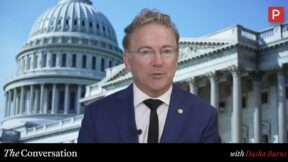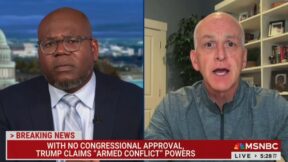Trump Attorney Complains To Fox News That Trump Can’t Speak At Fraud Trial In False Rant
Trump attorney Alina Habba complained to Fox News that former President Donald Trump can’t speak at the close of his fraud trial.
The trial in the fraud case brought by New York Attorney General Letitia James and presided over by Judge Arthur Engoron concludes with closing arguments on Thursday, January 11, 2024 — at which Trump has been forbidden to speak after his lawyers refused to agree to restrictions..
On Thursday morning’s edition of Fox News Channel’s Fox & Friends First, Habba complained to co-anchors Carley Shimkus and Todd Piro about the case in terms that were at odds with the actual emails between Judge Engoron and Trump’s team:
TODD PIRO: Former President Donald Trump dismissing the impact his legal battles could have on his presidential campaign, as he is due back in a Manhattan courtroom for closing arguments in a civil fraud trial today. Now, Trump’s legal team asked to delay this in light of the death of his mother in law. The judge refused.
CARLEY SHIMKUS: The judge also says, I assume that Mr. Trump will not agree to the reasonable, lawful limits I have imposed as a precondition to giving a closing statement. Therefore, he will not be speaking in court tomorrow. Former President Trump’s attorney, Alina Harbor, joins us now. Alina. Good morning to you. Trump wanted to speak in court today. The judge said no. How big of a deal is this?
ALINA HABBA: Well, initially we had just asked, could we please postpone today? His mother-in-law clearly just died and he would have liked to have been with his family. The judge said no.
CARLEY SHIMKUS: Why?
ALINA HABBA: Um, his reasoning was something I can’t get into, but. Ridiculous. You know, there’s security we have to pay for. So, I don’t know, uh, the most security that gets paid for is the Secret Service that comes with the president that has to get disrupted, fly in, fly out.
But, uh, they have no problem wasting taxpayer dollars for the last three months, so I don’t understand that reasoning. He required him to come in when his family is grieving. That’s number one.
Number two, the president, as a defendant, wanted to put words on the record and say what he had to say in terms of his closing. He has a right to get up and speak. He is a defendant. The judge said, oh, okay. But we’re going to restrict that speech again. Now, remember, this is a judge that put a gag order on me, on the president. All the lawyers and we’re dealing with that every day. So the, you know, the president wouldn’t speak, and I would never have him speak under those circumstances.
TODD PIRO: And to be clear, it’s one thing to limit closing arguments to the information and evidence presented at trial. That’s a rule that everybody needs to follow, all lawyers. But how much further did the judge order go beyond that? In limiting what Donald Trump could say?
ALINA HABBA: Effectively, he didn’t want him to litigate the ugly parts of the case. He didn’t want Donald Trump to say a lot of things that we would be saying. Now I’m not sure why. Because if you don’t have him say it, I’m going to say it. And I’m a pretty big, loudmouth myself. So, you know, he has a right. And I think we’re seeing this consistently across a lot of these cases.
They gag him, they tell him you can’t publicly say it. They say you can’t even say it when you’re at home. On Truth Social, you can’t say it on Twitter. Imagine free speech being completely not for a normal person, never mind us, but for the leading candidate of the Republican Party. It’s so obvious what they’re doing. I’m tired of it. And I think the American people are really getting tired of it.
But Engoron offered to let Trump testify if he would agree to conditions that are at odds with Habba’s description:
Thus, in my sole discretion, I will consent to let Mr. Trump make a closing argument if, and only if, through counsel by 1/9/2024, and by himself, personally, on the record, just before he speaks, he agrees to limit his subjects to what is permissible in a counsel’s closing argument, that is, commentary on the relevant, material facts that are in evidence, and application of the relevant law to those facts. He may not seek to introduce new evidence. He may not “testify.” He may not comment on irrelevant matters. In particular, and without limitation, he may not deliver a campaign speech, and he may not impugn myself, my staff, plaintiff, plaintiff’s staff, or the New York State Court System, none of which is relevant to this case, and all of which, except commenting on my staff, can be done, and is being done, in other forums.
Watch above via Fox News Channel’s Fox & Friends First.




